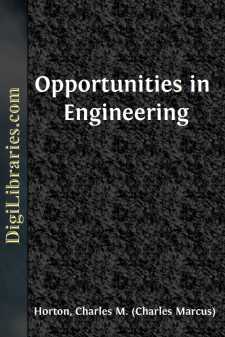Categories
- Antiques & Collectibles 13
- Architecture 36
- Art 48
- Bibles 22
- Biography & Autobiography 813
- Body, Mind & Spirit 142
- Business & Economics 28
- Children's Books 17
- Children's Fiction 14
- Computers 4
- Cooking 94
- Crafts & Hobbies 4
- Drama 346
- Education 46
- Family & Relationships 57
- Fiction 11829
- Games 19
- Gardening 17
- Health & Fitness 34
- History 1377
- House & Home 1
- Humor 147
- Juvenile Fiction 1873
- Juvenile Nonfiction 202
- Language Arts & Disciplines 88
- Law 16
- Literary Collections 686
- Literary Criticism 179
- Mathematics 13
- Medical 41
- Music 40
- Nature 179
- Non-Classifiable 1768
- Performing Arts 7
- Periodicals 1453
- Philosophy 64
- Photography 2
- Poetry 896
- Political Science 203
- Psychology 42
- Reference 154
- Religion 513
- Science 126
- Self-Help 84
- Social Science 81
- Sports & Recreation 34
- Study Aids 3
- Technology & Engineering 59
- Transportation 23
- Travel 463
- True Crime 29
Opportunities in Engineering
Categories:
Description:
Excerpt
ENGINEERING AND THE ENGINEER
Several years ago, at the regular annual meeting of one of the major engineering societies, the president of the society, in the formal address with which he opened the meeting, gave expression to a thought so startling that the few laymen who were seated in the auditorium fairly gasped. What the president said in effect was that, since engineers had got the world into war, it was the duty of engineers to get the world out of war. As a thought, it probably reflected the secret opinion of every engineer present, for, however innocent of intended wrong-doing engineers assuredly are as a group in their work of scientific investigation and development, the statement that engineers were responsible for the conflict then raging in Europe was absolute truth.
I mention this merely to bring to the reader's attention the tremendous power which engineers wield in world affairs.
The profession of engineering—which, by the way, is merely the adapting of discoveries in science and art to the uses of mankind—is a peculiarly isolated one. But very little is known about it among those outside of the profession. Laymen know something about law, a little about medicine, quite a lot—nowadays—about metaphysics. But laymen know nothing about engineering. Indeed, a source of common amusement among engineers is the peculiar fact that the average layman cannot differentiate between the man who runs a locomotive and the man who designs a locomotive. In ordinary parlance both are called engineers. Yet there is a difference between them—a difference as between day and night. For one merely operates the results of the creative genius of the other. This almost universal ignorance as to what constitutes an engineer serves to show to what broad extent the profession of engineering is isolated.
Yet it is a wonderful profession. I say this with due regard for all other professions. For one cannot but ponder the fact that, if engineers started the greatest war the world has ever known—and engineers as a body freely admit that if they did not start it they at least made it possible—they also stopped it, thereby proving themselves possessed of a power greater than that of any other class of professional men—diplomats and lawyers and divinities not excepted.
That engineering is a force fraught with stupendous possibilities, therefore, nobody can very well deny. That it is a force generally exercised for good—despite the World War—I myself, as an engineer, can truly testify. With some fifteen years spent on the creative end of the work—the drafting and designing end—I have yet to see, with but two or three rare exceptions, the genius of engineers turned into any but noble channels.
Thus, engineering is not only a wonderful profession, with the activities of its followers of utmost importance, but also it is a profession the individual work of whose pioneers, from Watt to Westinghouse and from Eiffel to Edison, has been epoch-making.
For when James Watt, clock-repairer, tinker, being called into a certain small laboratory in England more than a century ago to make a few minor repairs on a new design of steam-engine, discovered, while at work on this crude unit deriving its motion from expanded steam and the alternate workings of a lever actuated by a weight, the value of superheated steam for power purposes, and later embodied the idea in a steam-engine of his own, Watt set the civilized world forward into an era so full of promise and discovery that even we who are living to-day, despite the wonderful progress already made in mechanics as represented among other things in the high-speed engine, the dynamo, the airplane, are witnessing but the barest of beginnings....








